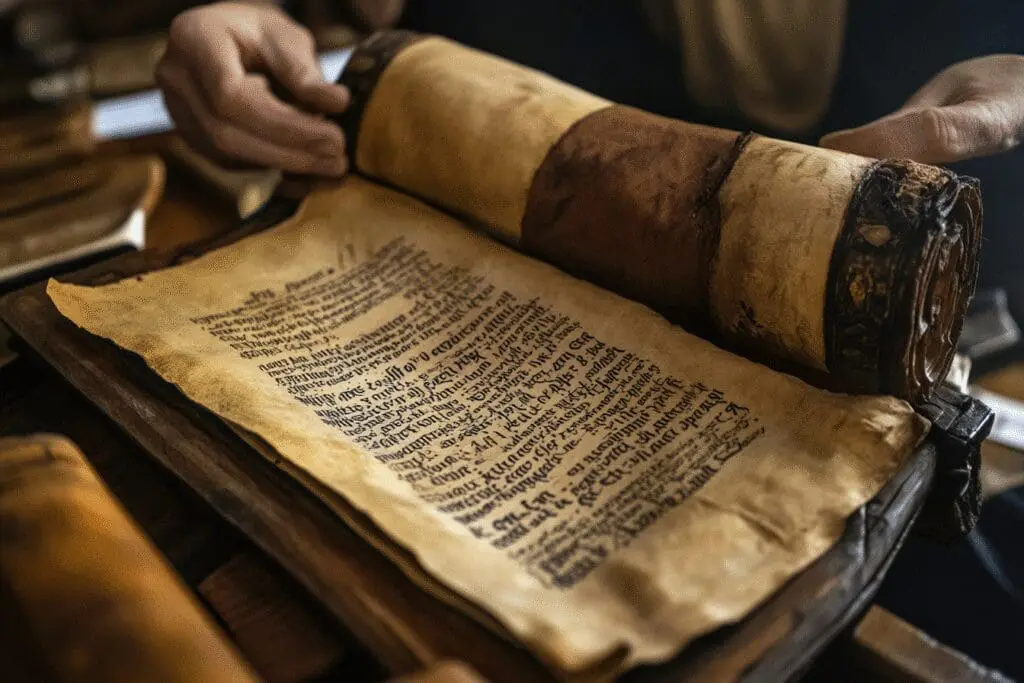Let’s get straight to the heart of your question. The Book of Eli was never in the Bible. Therefore, it could not have been removed. This is the simple and direct truth.
You might be surprised to hear that. Many people wonder about this. “The Book of Eli” is actually the title of a popular movie from 2010. It is not an ancient book of scripture. The film tells a powerful story about faith. It shows the importance of the Bible in a dark world.
This common confusion is completely understandable. The movie’s title sounds like it could be a real book from the Bible. You have books like the Book of Isaiah or the Book of Job. So, the question itself is a good one. It opens up a truly fascinating topic. How did we get the Bible we have today?
This article will clear everything up. We will explore why the movie causes this question. We will look at how the real books of the Bible were chosen. We will also dive into the beautiful Christian themes in the movie. The confusion about why The Book of Eli was removed from the Bible is a great starting point for a journey into the history of our faith.
More in Bible Category
Did Martin Luther Remove Books from the Bible
Why Was the Geneva Bible Banned
Key Takeaways
- The Book of Eli is a 2010 post-apocalyptic movie. It is not an actual book of scripture.
- Because it was never a biblical text, it was never removed from the Bible.
- The Bible’s contents were chosen over centuries. This careful process is called canonization.
- Early church leaders used specific criteria to decide which books were inspired by God.
- The movie has powerful Christian themes. It highlights faith, sacrifice, and the supreme importance of God’s Word.
What Is the Book of Eli, Really?
So, if it’s not a lost book of the Bible, what is it? “The Book of Eli” is a fictional story. It stars Denzel Washington as a man named Eli. He is a wanderer in a post-apocalyptic America. The world was destroyed by war decades earlier.
Eli is on a mission from God. He has been walking for thirty years. His goal is to carry the last known copy of the King James Bible to a safe place on the west coast. He protects it with his life. He believes it holds the key to humanity’s future. The movie is about his dangerous journey and his unwavering faith.
Is the Book of Eli a True Story?
No, the story is entirely fiction. There was no nuclear war that destroyed all the Bibles. The characters are not real people from history. The movie uses this fictional setting to make a point. It wants to show us how precious the Bible is. It imagines a world without God’s Word. And it shows how desperately that world needs it.
The story feels real because its themes are so powerful. Hope, faith, purpose, and sacrifice are very real. Eli’s commitment to his mission feels like the commitment of the saints and martyrs we read about. That is why the story connects so deeply with people of faith.
Why Do So Many People Think It Was a Real Book?
The confusion is very common. There are a few key reasons for this. As we mentioned, the title itself sounds official. It fits the pattern of other books in the Bible.
Furthermore, the movie treats the book with so much reverence. Eli protects it like the most valuable treasure on Earth. This elevates the book in the viewer’s mind. The whole plot revolves around this single book. It makes you feel its immense importance.
Finally, the film’s message about the Bible’s power is very strong. It shows the words inside have the power to change the world. This aligns with what we as Christians believe. The movie did such a good job showing the Bible’s value. It’s no wonder people think the story itself might be from scripture.
So, How Was the Actual Bible Put Together?
The story of how we got the Bible is amazing. It is a story of God’s guidance over thousands of years. It didn’t just appear one day. It was a long and prayerful process. The Lord worked through His people to gather the holy scriptures.
This collection of books is called the “canon” of scripture. The word canon comes from a Greek word meaning “measuring stick.” The canon is the standard by which we measure our faith and teachings. It is the collection of books the church recognized as divinely inspired.
Did God Just Hand Us a Finished Bible?
No, God worked through human authors over many centuries. The Holy Spirit inspired prophets, kings, poets, and apostles. They wrote down God’s message for His people.
The Old Testament was written over a period of more than a thousand years. Jewish scribes and scholars carefully preserved these texts. Jesus and the apostles quoted from these same Old Testament scriptures.
The New Testament books were written in the decades after Christ’s resurrection. The apostles and their close companions wrote them. They wrote letters to churches and individuals. They also wrote the Gospels to record the life and teachings of Jesus. The early Christians began collecting and sharing these writings almost immediately.
What Does “Canon” Mean for the Bible?
The canon is the official list of books that belong in the Bible. How did the early church know which books to include? They looked for specific signs of God’s authority. They didn’t just vote on their favorites. They recognized what God had already inspired.
Here were some of the main criteria:
- Apostolic Author: Was the book written by an apostle or someone very close to an apostle? They were the firsthand witnesses to Jesus.
- Widespread Acceptance: Was the book accepted by the church across the world from early on?
- Consistent Message: Did the book’s teachings align with the rest of scripture? Did it teach the truth about Jesus Christ?
- Spirit-Led Testimony: Did the book show evidence of the Holy Spirit’s work? Did it change lives?
This process took time. By the end of the fourth century, the church had reached a strong consensus. They were not deciding what was scripture. They were recognizing the books that had proven themselves to be God’s Word all along.
Were There Other Books That Didn’t Make It In?
Yes, there were many other religious writings at the time. This is another reason people might think a book like Eli’s was removed. The early church had to carefully sort through many texts. They separated the inspired ones from the others. These other books fall into a few different categories.
What are the Apocrypha or Deuterocanonical Books?
This is a group of books written in the period between the Old and New Testaments. You may have heard of some of them. They include books like Tobit, Judith, Wisdom of Solomon, and 1 and 2 Maccabees.
There is some disagreement about these books. The Catholic Church accepts them as part of the Old Testament. They call them the “deuterocanonical” books. Most Protestant traditions do not. They call them the “Apocrypha.”
Protestant Bibles often placed them in a separate section. They saw them as useful for historical information. But they did not see them as having the same divine authority as the canonical books.
What About Gnostic Gospels like the Gospel of Thomas?
This is another group of writings. They were written much later, mostly in the second century and beyond. These books claimed to offer “secret knowledge” about Jesus. This is where the term “Gnostic” comes from. It means “knowledge.”
These books presented a very different picture of Jesus. They often contradicted the teachings of the four main Gospels. The early church leaders reviewed these books carefully. They rejected them as false teachings. They were not written by the apostles. They also did not align with the core message of the gospel.
For these reasons, they were never considered for the Bible. You can learn more about these fascinating historical texts from academic sources. The Yale Divinity School Library has excellent information on these later writings.
Why Were Some Ancient Books Left Out?
To put it simply, some books were not included for very good reasons. The early church fathers took their task very seriously. They prayed and sought God’s wisdom.
Here is a quick summary of why a book might be excluded:
- It was written too late to be from an apostle.
- The authorship was unknown or known to be false.
- It contained teachings that went against the established Word of God.
- It was only used or accepted by a small, isolated group.
The process protected the church from false teachings. It ensured the Bible we have is a reliable and true witness to God’s work.
What Can Christians Learn from the Movie “The Book of Eli”?
Even though it is fiction, the movie is filled with powerful truth. It can teach us a lot about our own faith. It reminds us of the incredible gift we have in the Holy Bible. We should not take it for granted.
The movie powerfully illustrates the scripture from Matthew 4:4. “Man shall not live by bread alone, but by every word that comes from the mouth of God.” In the movie’s world, this is literally true. The Word of God is the only thing that offers real hope.
Why is the Bible in the Movie a Braille Bible?
This is a key point in the film. We learn that Eli is blind. He cannot read the book with his eyes. He reads it with his hands. Over his thirty-year journey, he has memorized the entire thing.
This is deeply symbolic. Faith is not just about what we see. It is about taking God’s Word into our hearts. Eli didn’t just carry the book; the book became a part of him. He lived it. He could recite it from memory.
It also shows that the Word of God is for everyone. It is not just for the sighted or the learned. Its truth can be understood through the heart and the spirit. This reminds us that we need to internalize scripture. We must let it change us from the inside out.
Does the Movie Truly Show the Power of God’s Word?
Yes, it does so in a beautiful way. The film shows the Bible is not just an old book of rules. It is a living and active force for good.
In a world full of violence and despair, the Bible brings hope. It gives Eli a divine purpose. His life has meaning because of his mission. He is willing to sacrifice everything for it.
The villain, Carnegie, wants the Bible too. But he wants it for the wrong reasons. He wants to use its words to control people. This shows that the Word is powerful. It can be used for good or twisted for evil. This is a warning to us. We must approach the Bible with a humble and pure heart.
What is the Main Message for Christians Today?
The movie’s message is a wake-up call. Many of us have multiple Bibles in our homes. We can access it on our phones in seconds. We are so blessed. Do we truly appreciate this gift?
- Cherish the Word: We should treat our Bibles as precious treasures. They contain the words of eternal life.
- Read the Word: It is not enough to just own a Bible. We must spend time reading it every day. We must let it feed our souls.
- Live the Word: Like Eli, we must let the Bible become a part of us. Our actions should reflect its teachings.
- Share the Word: The movie’s ending is very important. The Bible is not just preserved. It is printed on a printing press. It is meant to be shared with the world. That is our Great Commission.
Why Does Understanding the Bible’s History Matter for Our Faith?
Learning about the Bible’s origins is so important. It doesn’t weaken our faith. It actually makes it much stronger. It shows us that our Bible rests on a solid foundation of history and divine guidance.
Some people worry that learning about the human element will make the Bible seem less divine. But we believe in a God who works in the real world. He works through real people. The story of the canon is the story of God guiding His church through history.
Does Knowing How the Bible Was Made Weaken It?
Not at all. It does the opposite. It shows that the Bible is not a myth or a fairy tale. It is rooted in verifiable history. We can be confident that God oversaw the entire process. He ensured that His true Word was preserved for all generations.
Seeing the care the early church took is inspiring. They dedicated their lives to protecting and sharing the truth. They did not take their job lightly. This gives us even more reason to trust the book they passed down to us. It is a heritage of faith.
How Can We Be Confident in the Bible We Hold Today?
Our confidence in the Bible comes from many sources. It is a faith built on powerful evidence.
First, we have the amazing consistency of its message. About 40 different authors wrote the Bible. They wrote over 1,500 years on three different continents. Yet, it tells one single, unified story of God’s redemption through Jesus Christ. That is a miracle.
Second, we have incredible manuscript evidence. There are thousands of ancient copies of the New Testament. They prove that the Bible we read today is the same one the early church read.
Finally, we have the witness of the Holy Spirit. When we read the Bible with an open heart, God speaks to us. He confirms its truth in our spirit. And we see the proof in the changed lives of countless millions of believers throughout history. The Bible is not just a book. It is the living Word of God.
A Story of Preservation
In the end, we can see that the question is based on a misunderstanding. The question about why The Book of Eli was removed from the Bible comes from a great movie, not a lost book.
However, the question leads us to an even better story. The true story of how we got our Bible. It is a story of God’s faithfulness. It is a story of the early church’s careful work. It is a story of preservation against all odds.
The movie “The Book of Eli” gives us a powerful picture of this. It shows a man dedicating his life to preserving God’s Word. This is a fictional echo of a real historical truth. For centuries, believers have given their lives to protect and copy the scriptures. They did this so we could hold it in our hands today.
So, while we cannot find the Book of Eli on the pages of our Bibles, we can find inspiration from its story in our hearts. It serves as a powerful reminder. It encourages us to open the real books of the Bible. It challenges us to cherish them, study them, and let God’s truth guide our own journey, one step at a time.
Frequently Asked Questions – Why Was the Book of Eli Removed from the Bible

What is the main lesson about the ‘Book of Eli’ myth regarding the Bible?
The main lesson is that the ‘Book of Eli’ is a fictional story and not based on real historical events of how the Bible was assembled; it highlights how stories can create powerful myths about sacred texts.
What are the Apocryphal books, and why are they sometimes excluded?
The Apocryphal books are writings included in the Septuagint and used by some Christian traditions but not in the Hebrew canon or most Protestant Bibles; their exclusion was part of a historical debate during the Reformation, not due to secret removals.
How was the Bible compiled into its current form?
The Bible was compiled over many centuries through a process of recognizing writings believed to have divine authority, based on their consistency with teachings, their apostolic origin, and their widespread use among early Christian communities.
Why do people think books were removed from the Bible?
Many believe books were removed due to myths and conspiracy theories, but historically, the canon of the Bible was formed gradually and deliberately, not by secret removal of texts, with the notable case of the Apocryphal books being classified differently by various traditions.
Was there ever a ‘Book of Eli’ in the Bible?
No, there has never been a book called the ‘Book of Eli’ in the Bible. The idea of such a book is a part of the movie’s fictional story, not historical or biblical reality.




